SWK3113 Social Work: Substance Use & Mental Health Presentation
VerifiedAdded on 2023/04/23
|14
|1731
|260
Presentation
AI Summary
This presentation addresses the challenges healthcare workers face when treating individuals with co-occurring substance use and mental health disorders. It defines substance use disorders and mental health issues, highlighting their impact on individuals' lives and the importance of integrated treatment approaches. The presentation reviews literature indicating a high prevalence of co-occurring disorders and discusses challenges such as accurate diagnosis, ethical considerations, and patient reluctance to seek help. Strategies to overcome these challenges include counseling, social support interventions, awareness campaigns, and empathetic patient care. The presentation concludes by emphasizing the need for flexibility, collaboration, and creativity in treatment to improve patient outcomes, referencing integrated treatment and evidence-based care.
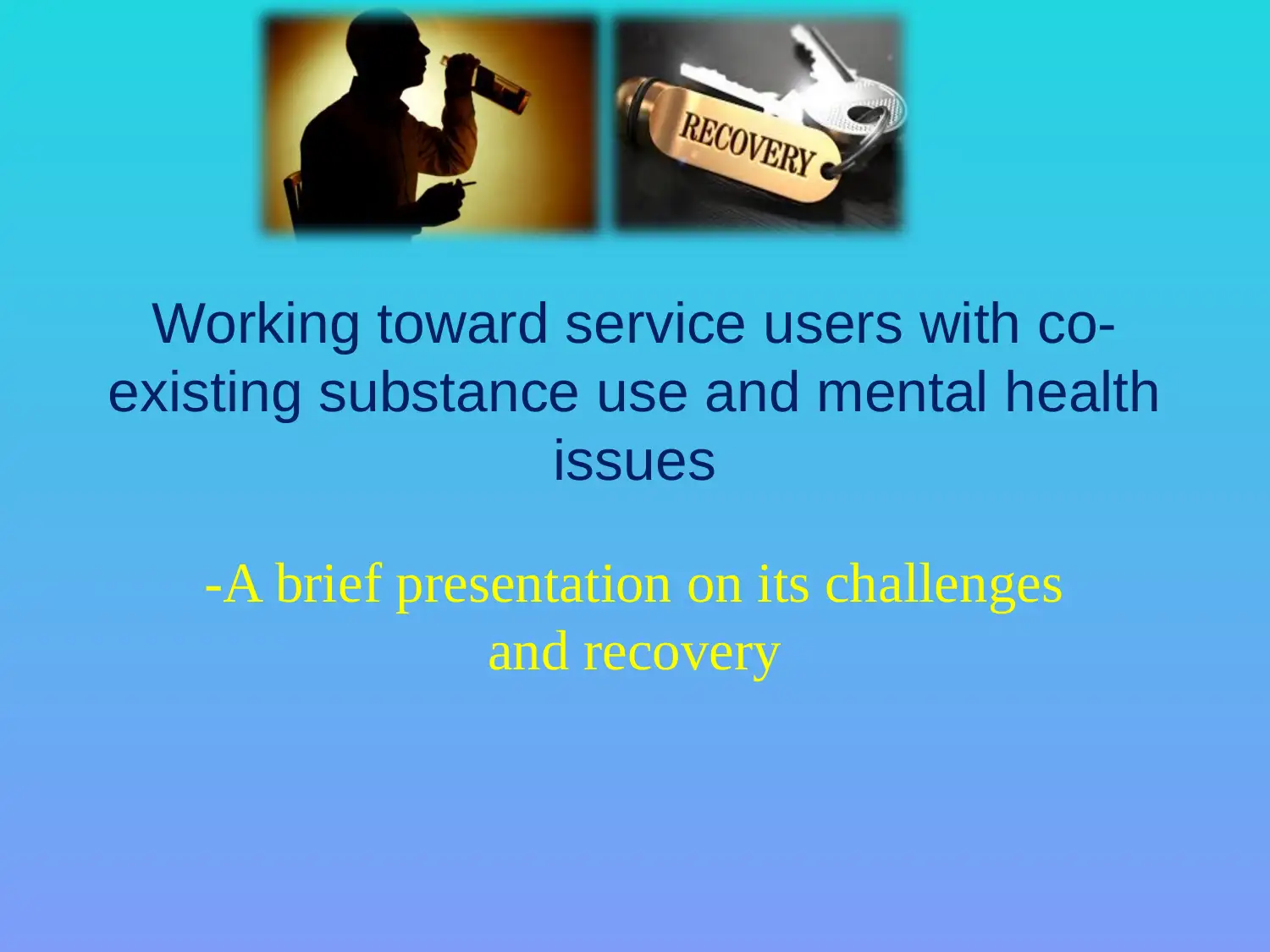
Working toward service users with co-
existing substance use and mental health
issues
-A brief presentation on its challenges
and recovery
existing substance use and mental health
issues
-A brief presentation on its challenges
and recovery
Paraphrase This Document
Need a fresh take? Get an instant paraphrase of this document with our AI Paraphraser
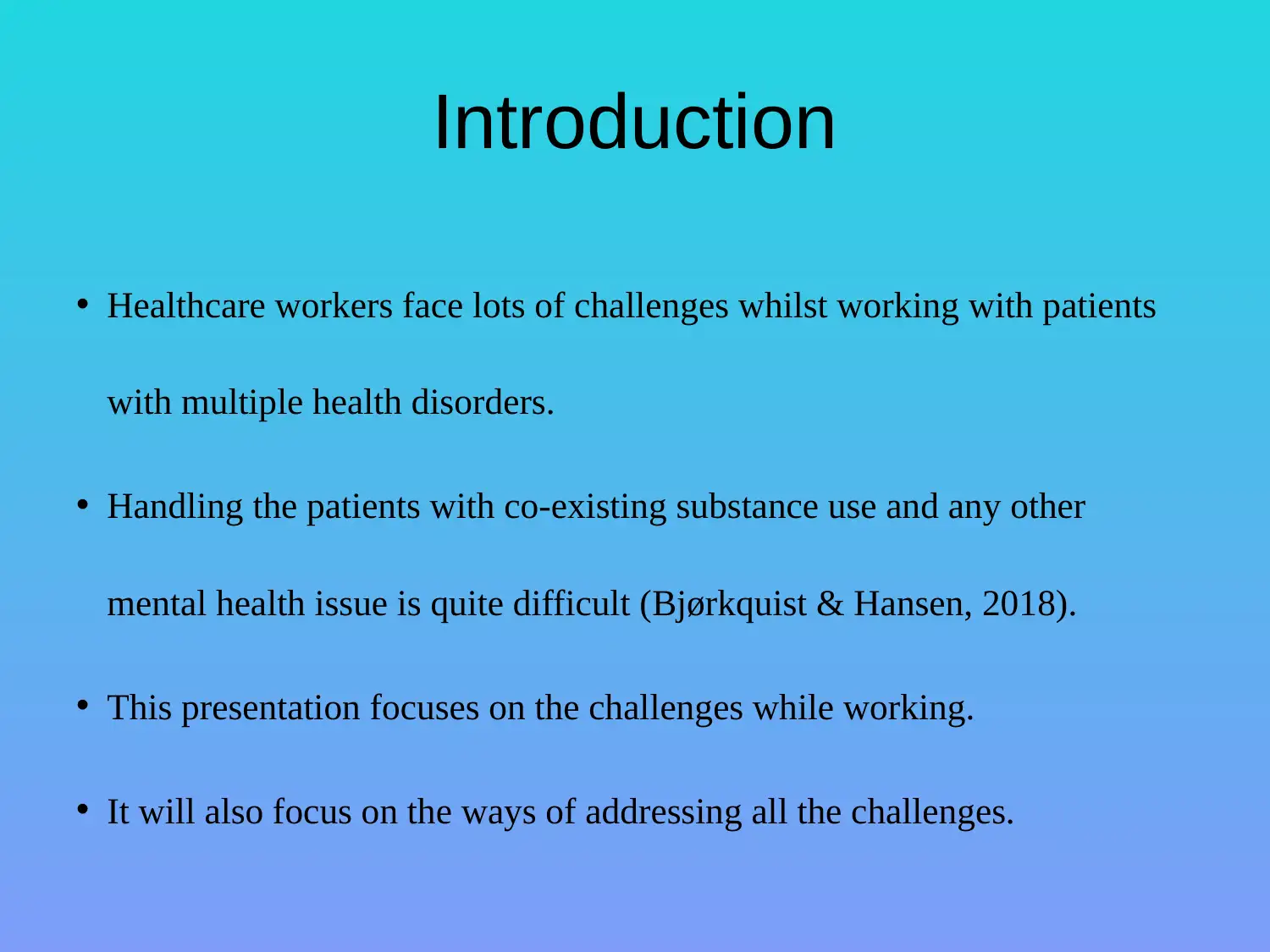
Introduction
• Healthcare workers face lots of challenges whilst working with patients
with multiple health disorders.
• Handling the patients with co-existing substance use and any other
mental health issue is quite difficult (Bjørkquist & Hansen, 2018).
• This presentation focuses on the challenges while working.
• It will also focus on the ways of addressing all the challenges.
• Healthcare workers face lots of challenges whilst working with patients
with multiple health disorders.
• Handling the patients with co-existing substance use and any other
mental health issue is quite difficult (Bjørkquist & Hansen, 2018).
• This presentation focuses on the challenges while working.
• It will also focus on the ways of addressing all the challenges.
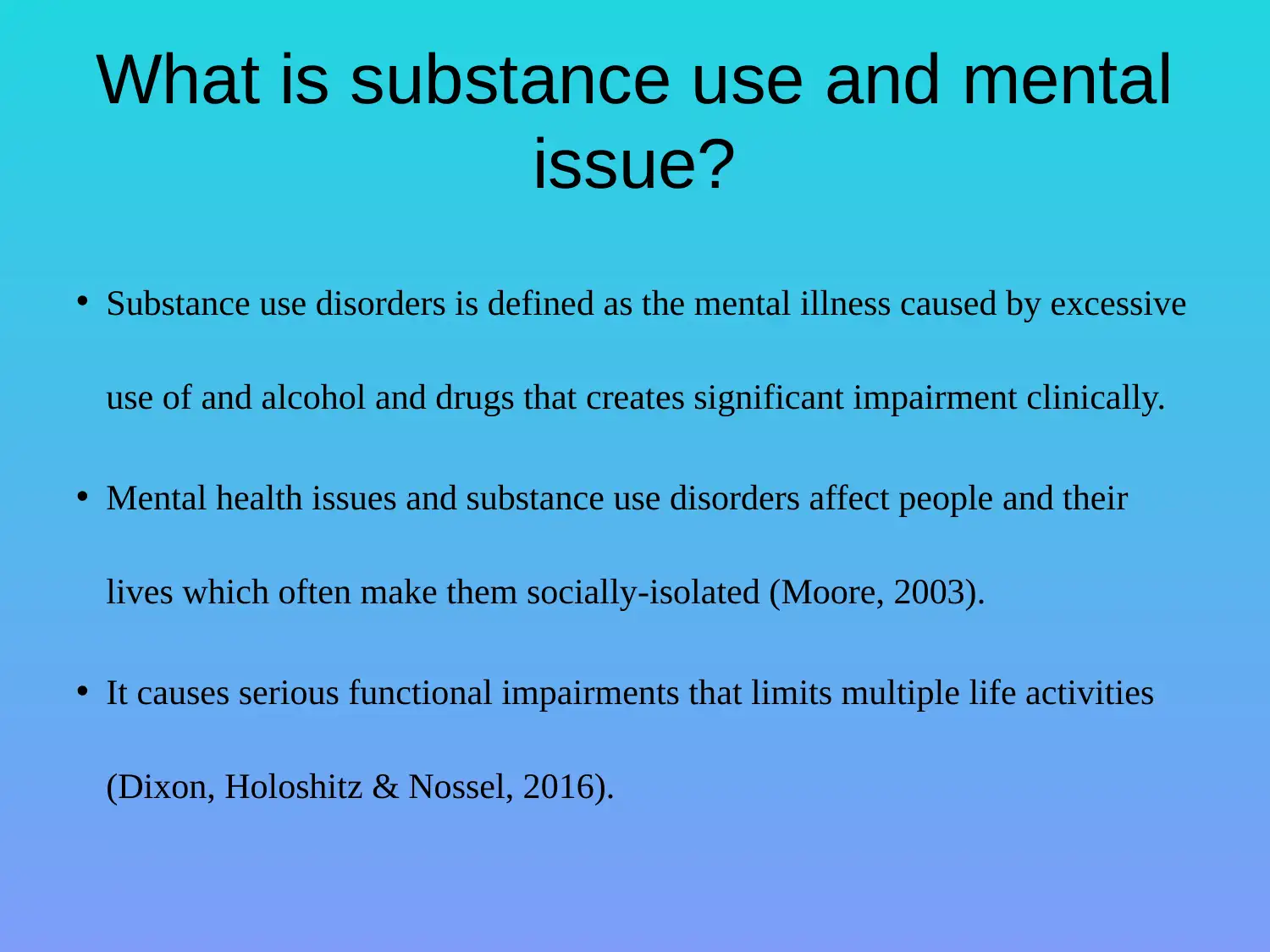
What is substance use and mental
issue?
• Substance use disorders is defined as the mental illness caused by excessive
use of and alcohol and drugs that creates significant impairment clinically.
• Mental health issues and substance use disorders affect people and their
lives which often make them socially-isolated (Moore, 2003).
• It causes serious functional impairments that limits multiple life activities
(Dixon, Holoshitz & Nossel, 2016).
issue?
• Substance use disorders is defined as the mental illness caused by excessive
use of and alcohol and drugs that creates significant impairment clinically.
• Mental health issues and substance use disorders affect people and their
lives which often make them socially-isolated (Moore, 2003).
• It causes serious functional impairments that limits multiple life activities
(Dixon, Holoshitz & Nossel, 2016).
⊘ This is a preview!⊘
Do you want full access?
Subscribe today to unlock all pages.

Trusted by 1+ million students worldwide
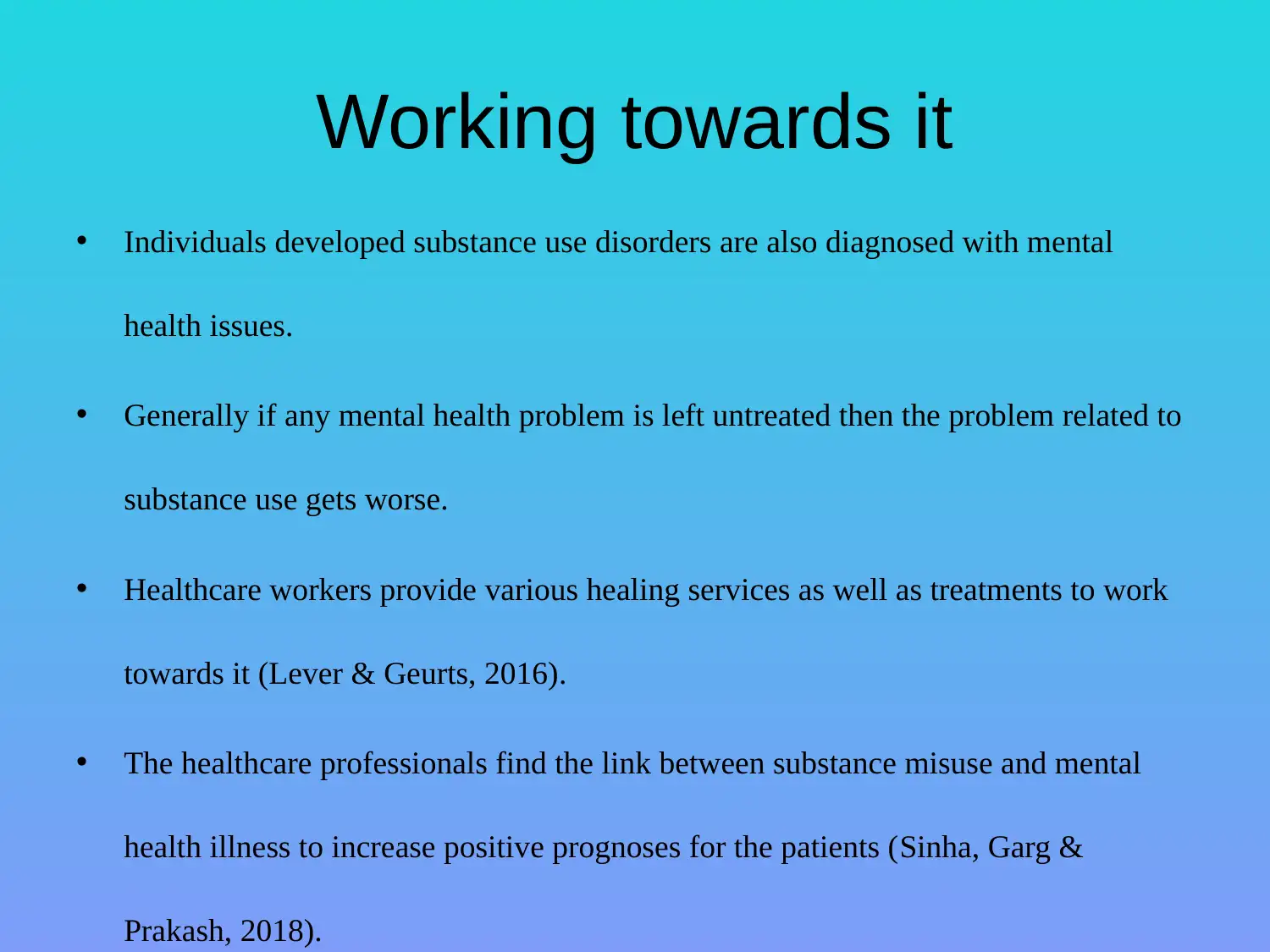
Working towards it
• Individuals developed substance use disorders are also diagnosed with mental
health issues.
• Generally if any mental health problem is left untreated then the problem related to
substance use gets worse.
• Healthcare workers provide various healing services as well as treatments to work
towards it (Lever & Geurts, 2016).
• The healthcare professionals find the link between substance misuse and mental
health illness to increase positive prognoses for the patients (Sinha, Garg &
Prakash, 2018).
• Individuals developed substance use disorders are also diagnosed with mental
health issues.
• Generally if any mental health problem is left untreated then the problem related to
substance use gets worse.
• Healthcare workers provide various healing services as well as treatments to work
towards it (Lever & Geurts, 2016).
• The healthcare professionals find the link between substance misuse and mental
health illness to increase positive prognoses for the patients (Sinha, Garg &
Prakash, 2018).
Paraphrase This Document
Need a fresh take? Get an instant paraphrase of this document with our AI Paraphraser
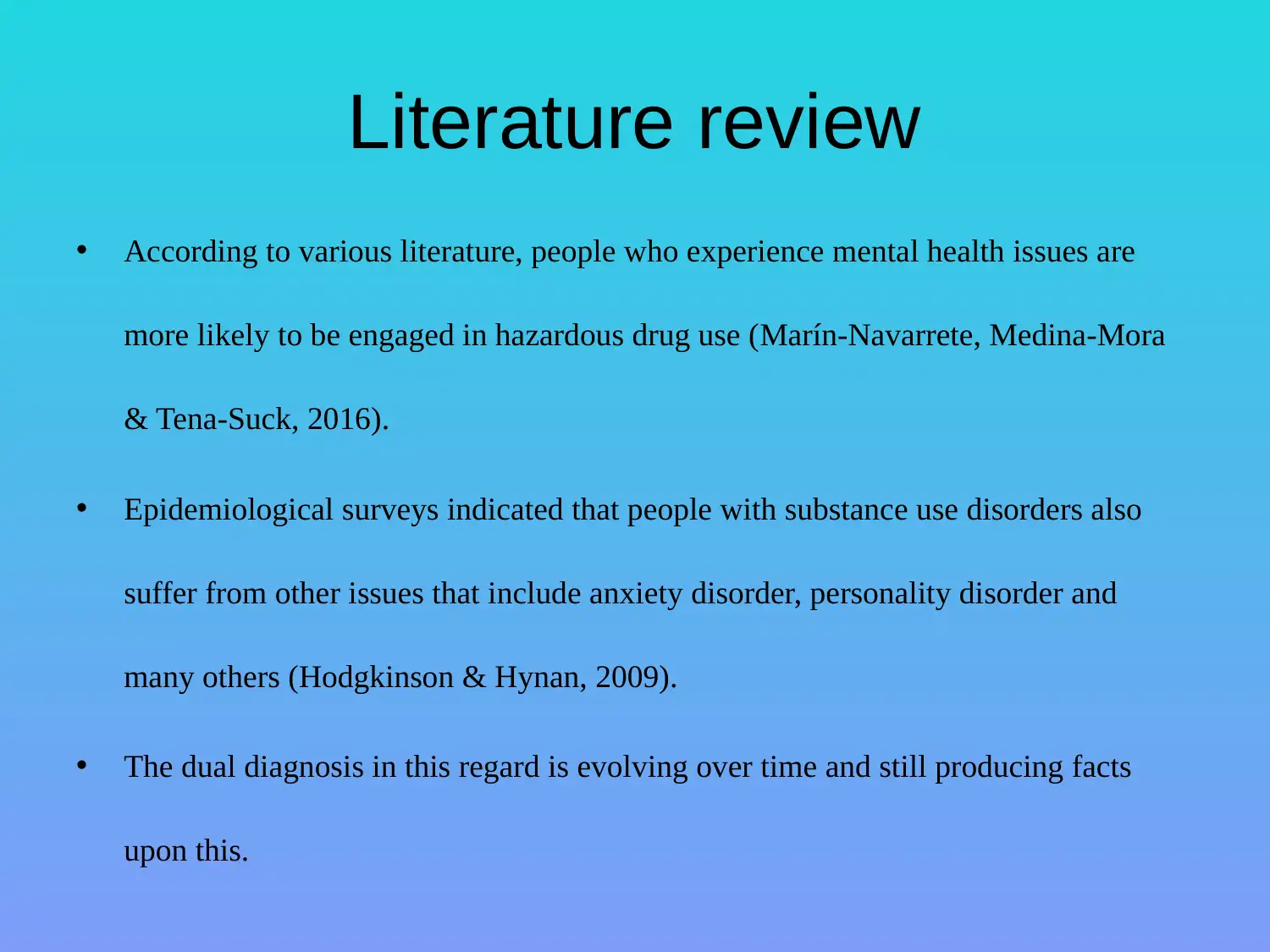
Literature review
• According to various literature, people who experience mental health issues are
more likely to be engaged in hazardous drug use (Marín-Navarrete, Medina-Mora
& Tena-Suck, 2016).
• Epidemiological surveys indicated that people with substance use disorders also
suffer from other issues that include anxiety disorder, personality disorder and
many others (Hodgkinson & Hynan, 2009).
• The dual diagnosis in this regard is evolving over time and still producing facts
upon this.
• According to various literature, people who experience mental health issues are
more likely to be engaged in hazardous drug use (Marín-Navarrete, Medina-Mora
& Tena-Suck, 2016).
• Epidemiological surveys indicated that people with substance use disorders also
suffer from other issues that include anxiety disorder, personality disorder and
many others (Hodgkinson & Hynan, 2009).
• The dual diagnosis in this regard is evolving over time and still producing facts
upon this.
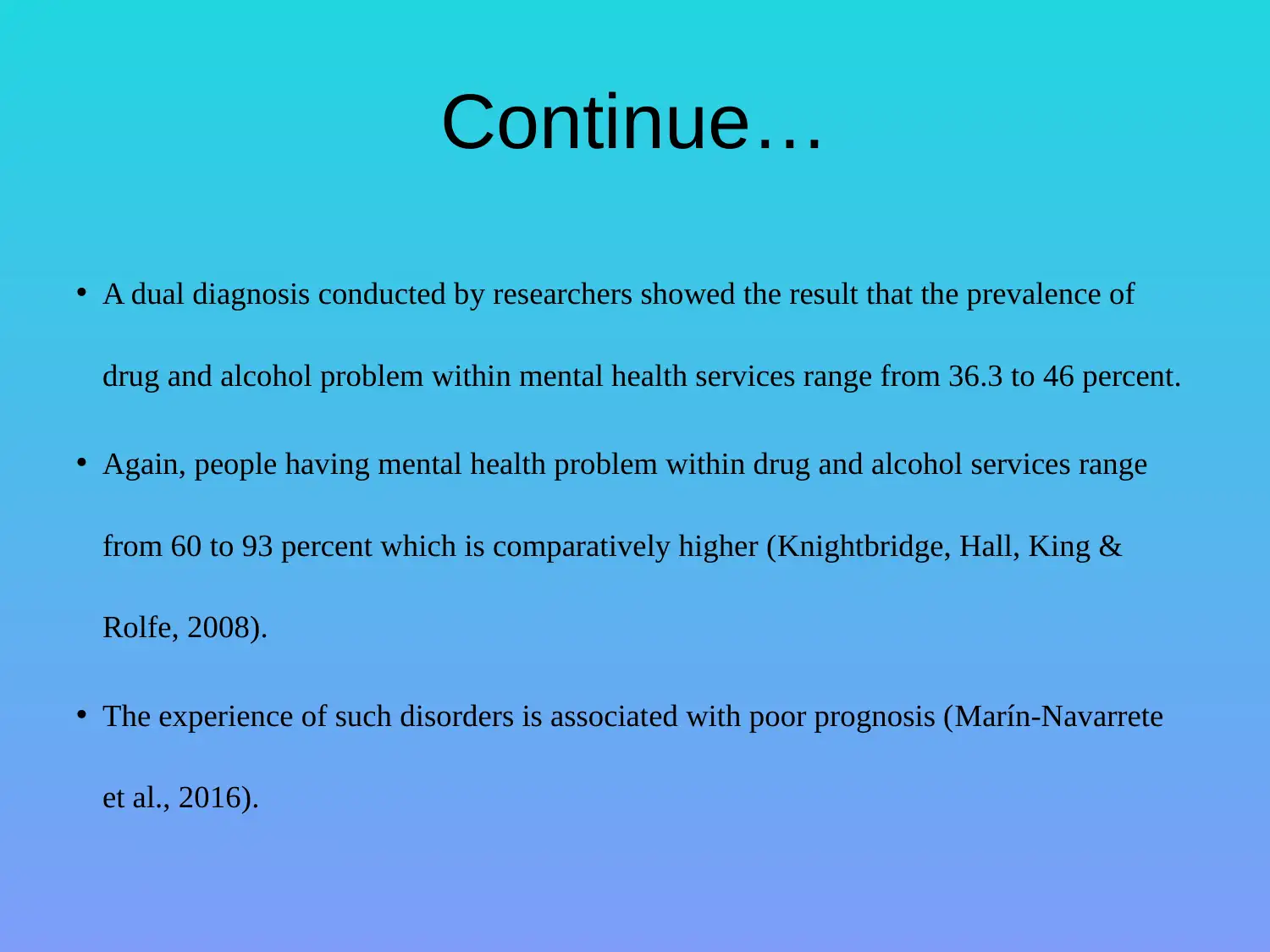
Continue…
• A dual diagnosis conducted by researchers showed the result that the prevalence of
drug and alcohol problem within mental health services range from 36.3 to 46 percent.
• Again, people having mental health problem within drug and alcohol services range
from 60 to 93 percent which is comparatively higher (Knightbridge, Hall, King &
Rolfe, 2008).
• The experience of such disorders is associated with poor prognosis (Marín-Navarrete
et al., 2016).
• A dual diagnosis conducted by researchers showed the result that the prevalence of
drug and alcohol problem within mental health services range from 36.3 to 46 percent.
• Again, people having mental health problem within drug and alcohol services range
from 60 to 93 percent which is comparatively higher (Knightbridge, Hall, King &
Rolfe, 2008).
• The experience of such disorders is associated with poor prognosis (Marín-Navarrete
et al., 2016).
⊘ This is a preview!⊘
Do you want full access?
Subscribe today to unlock all pages.

Trusted by 1+ million students worldwide
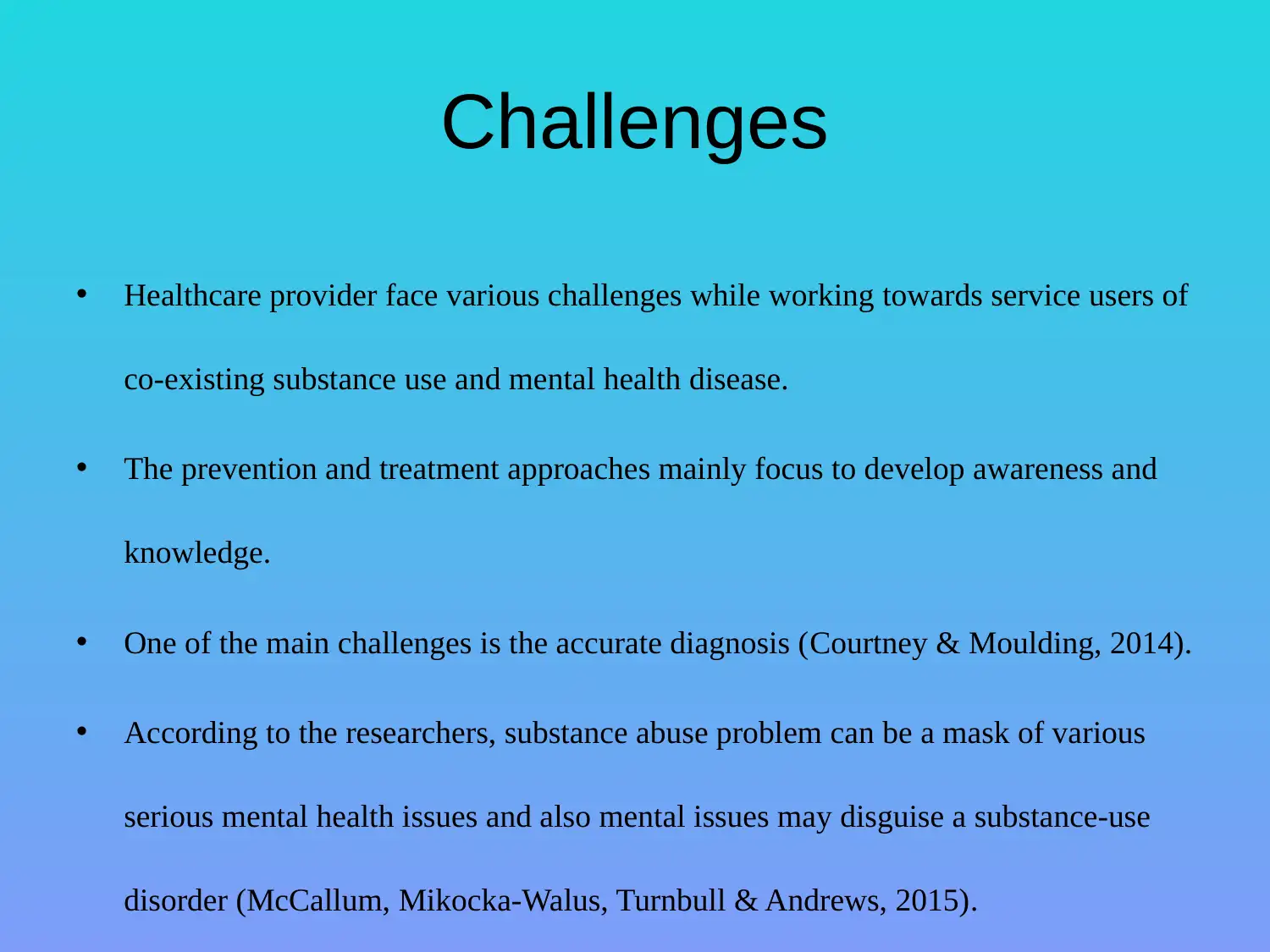
Challenges
• Healthcare provider face various challenges while working towards service users of
co-existing substance use and mental health disease.
• The prevention and treatment approaches mainly focus to develop awareness and
knowledge.
• One of the main challenges is the accurate diagnosis (Courtney & Moulding, 2014).
• According to the researchers, substance abuse problem can be a mask of various
serious mental health issues and also mental issues may disguise a substance-use
disorder (McCallum, Mikocka-Walus, Turnbull & Andrews, 2015).
• Healthcare provider face various challenges while working towards service users of
co-existing substance use and mental health disease.
• The prevention and treatment approaches mainly focus to develop awareness and
knowledge.
• One of the main challenges is the accurate diagnosis (Courtney & Moulding, 2014).
• According to the researchers, substance abuse problem can be a mask of various
serious mental health issues and also mental issues may disguise a substance-use
disorder (McCallum, Mikocka-Walus, Turnbull & Andrews, 2015).
Paraphrase This Document
Need a fresh take? Get an instant paraphrase of this document with our AI Paraphraser
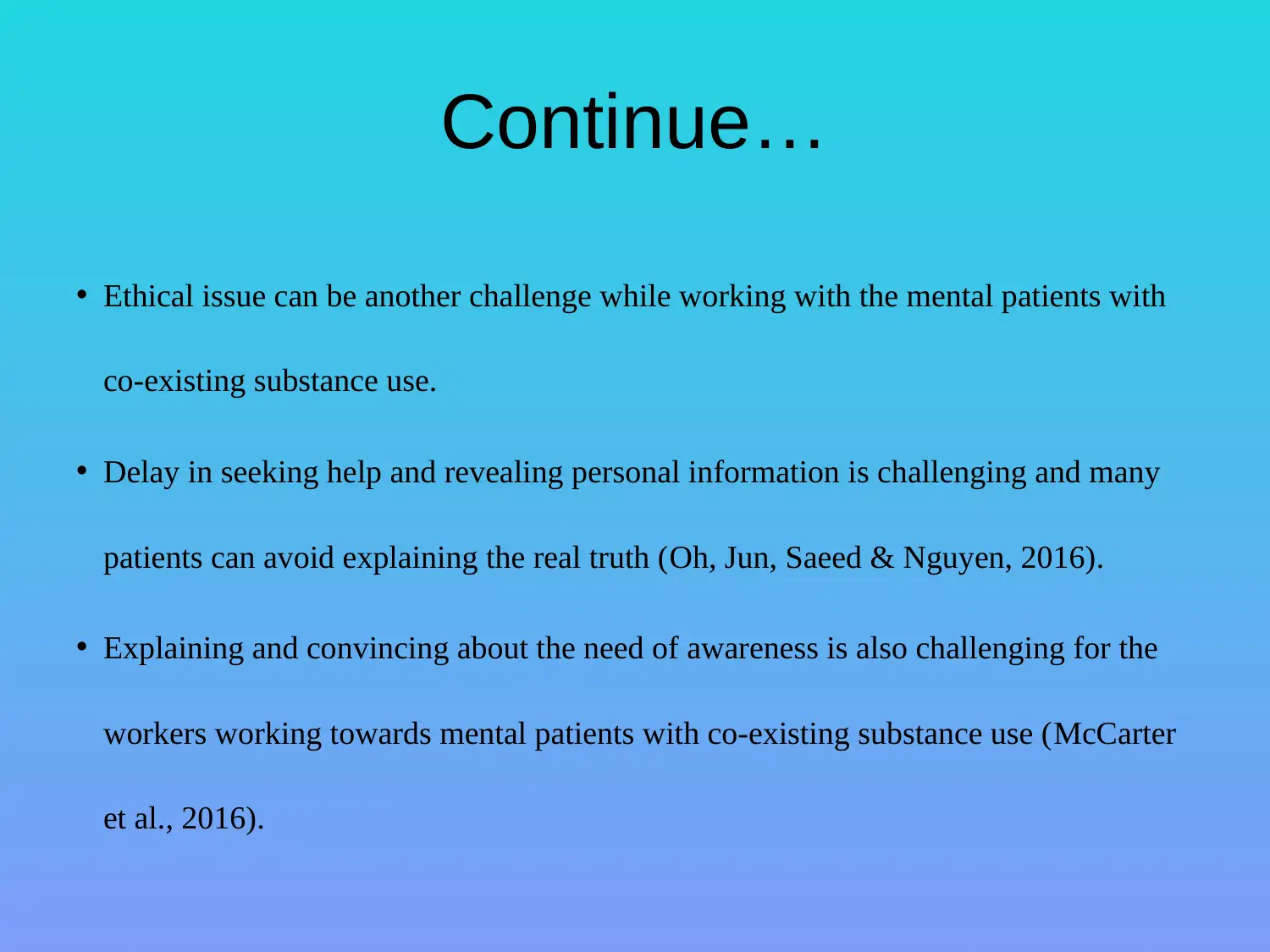
Continue…
• Ethical issue can be another challenge while working with the mental patients with
co-existing substance use.
• Delay in seeking help and revealing personal information is challenging and many
patients can avoid explaining the real truth (Oh, Jun, Saeed & Nguyen, 2016).
• Explaining and convincing about the need of awareness is also challenging for the
workers working towards mental patients with co-existing substance use (McCarter
et al., 2016).
• Ethical issue can be another challenge while working with the mental patients with
co-existing substance use.
• Delay in seeking help and revealing personal information is challenging and many
patients can avoid explaining the real truth (Oh, Jun, Saeed & Nguyen, 2016).
• Explaining and convincing about the need of awareness is also challenging for the
workers working towards mental patients with co-existing substance use (McCarter
et al., 2016).
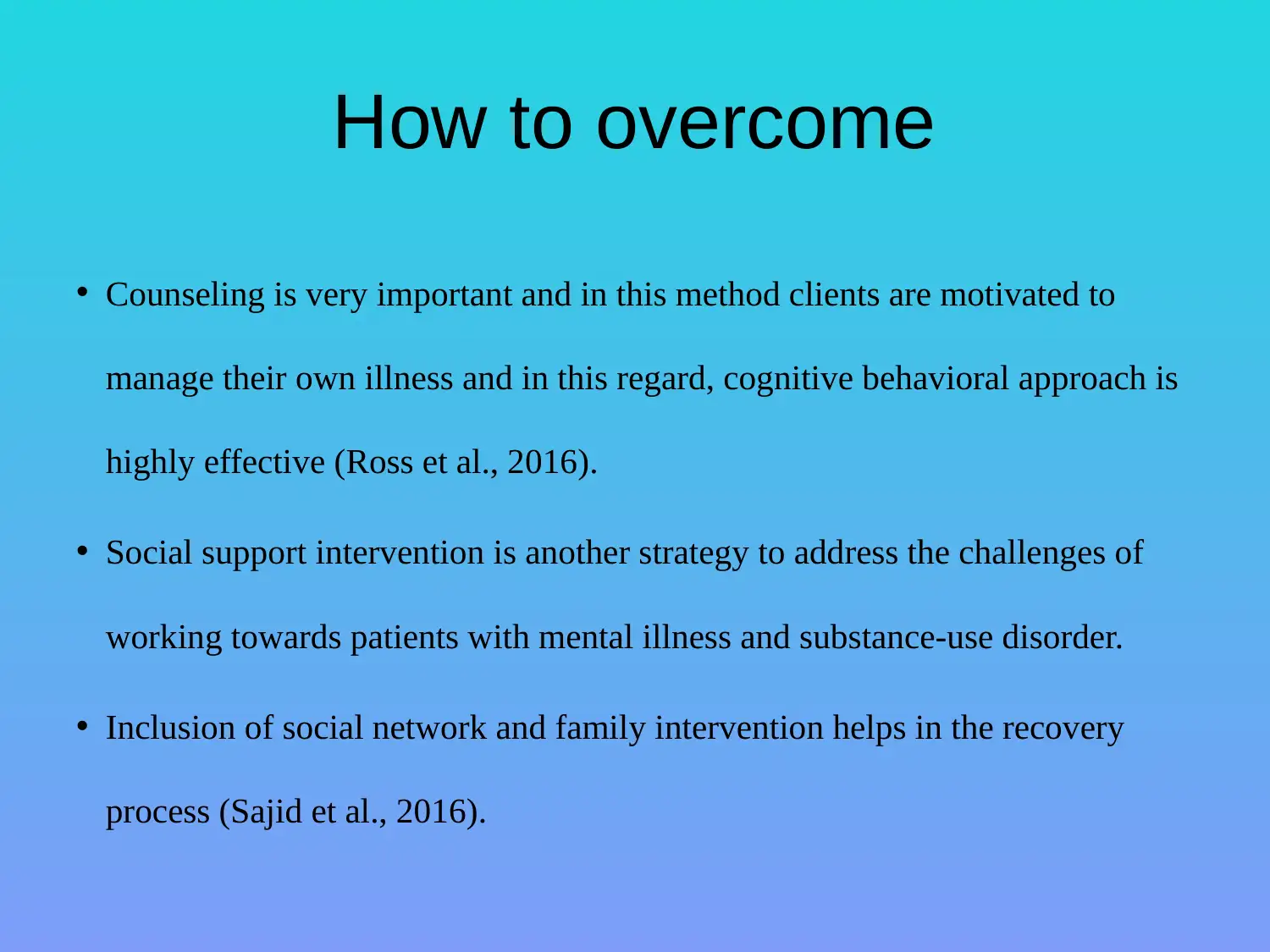
How to overcome
• Counseling is very important and in this method clients are motivated to
manage their own illness and in this regard, cognitive behavioral approach is
highly effective (Ross et al., 2016).
• Social support intervention is another strategy to address the challenges of
working towards patients with mental illness and substance-use disorder.
• Inclusion of social network and family intervention helps in the recovery
process (Sajid et al., 2016).
• Counseling is very important and in this method clients are motivated to
manage their own illness and in this regard, cognitive behavioral approach is
highly effective (Ross et al., 2016).
• Social support intervention is another strategy to address the challenges of
working towards patients with mental illness and substance-use disorder.
• Inclusion of social network and family intervention helps in the recovery
process (Sajid et al., 2016).
⊘ This is a preview!⊘
Do you want full access?
Subscribe today to unlock all pages.

Trusted by 1+ million students worldwide
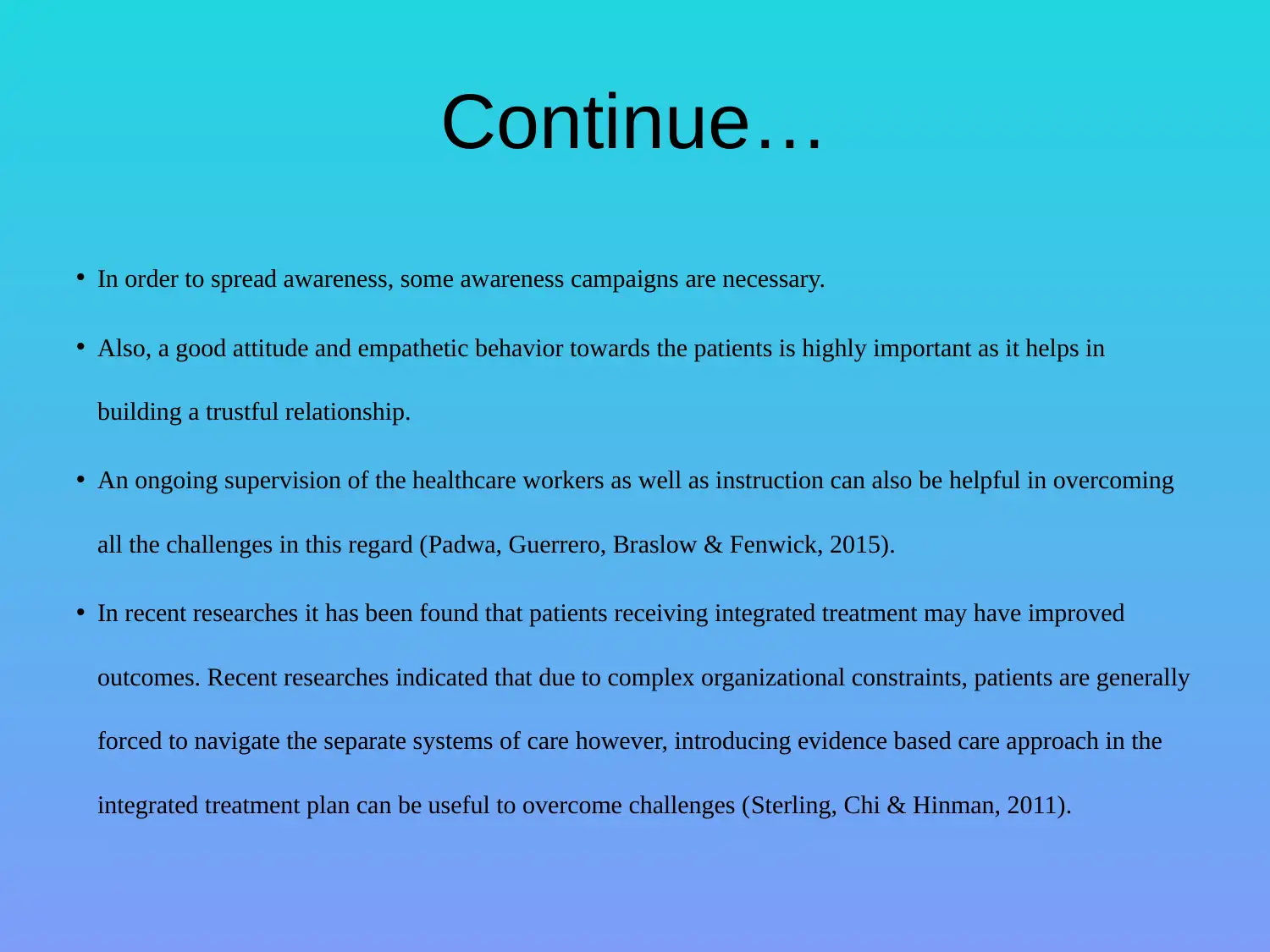
Continue…
• In order to spread awareness, some awareness campaigns are necessary.
• Also, a good attitude and empathetic behavior towards the patients is highly important as it helps in
building a trustful relationship.
• An ongoing supervision of the healthcare workers as well as instruction can also be helpful in overcoming
all the challenges in this regard (Padwa, Guerrero, Braslow & Fenwick, 2015).
• In recent researches it has been found that patients receiving integrated treatment may have improved
outcomes. Recent researches indicated that due to complex organizational constraints, patients are generally
forced to navigate the separate systems of care however, introducing evidence based care approach in the
integrated treatment plan can be useful to overcome challenges (Sterling, Chi & Hinman, 2011).
• In order to spread awareness, some awareness campaigns are necessary.
• Also, a good attitude and empathetic behavior towards the patients is highly important as it helps in
building a trustful relationship.
• An ongoing supervision of the healthcare workers as well as instruction can also be helpful in overcoming
all the challenges in this regard (Padwa, Guerrero, Braslow & Fenwick, 2015).
• In recent researches it has been found that patients receiving integrated treatment may have improved
outcomes. Recent researches indicated that due to complex organizational constraints, patients are generally
forced to navigate the separate systems of care however, introducing evidence based care approach in the
integrated treatment plan can be useful to overcome challenges (Sterling, Chi & Hinman, 2011).
Paraphrase This Document
Need a fresh take? Get an instant paraphrase of this document with our AI Paraphraser
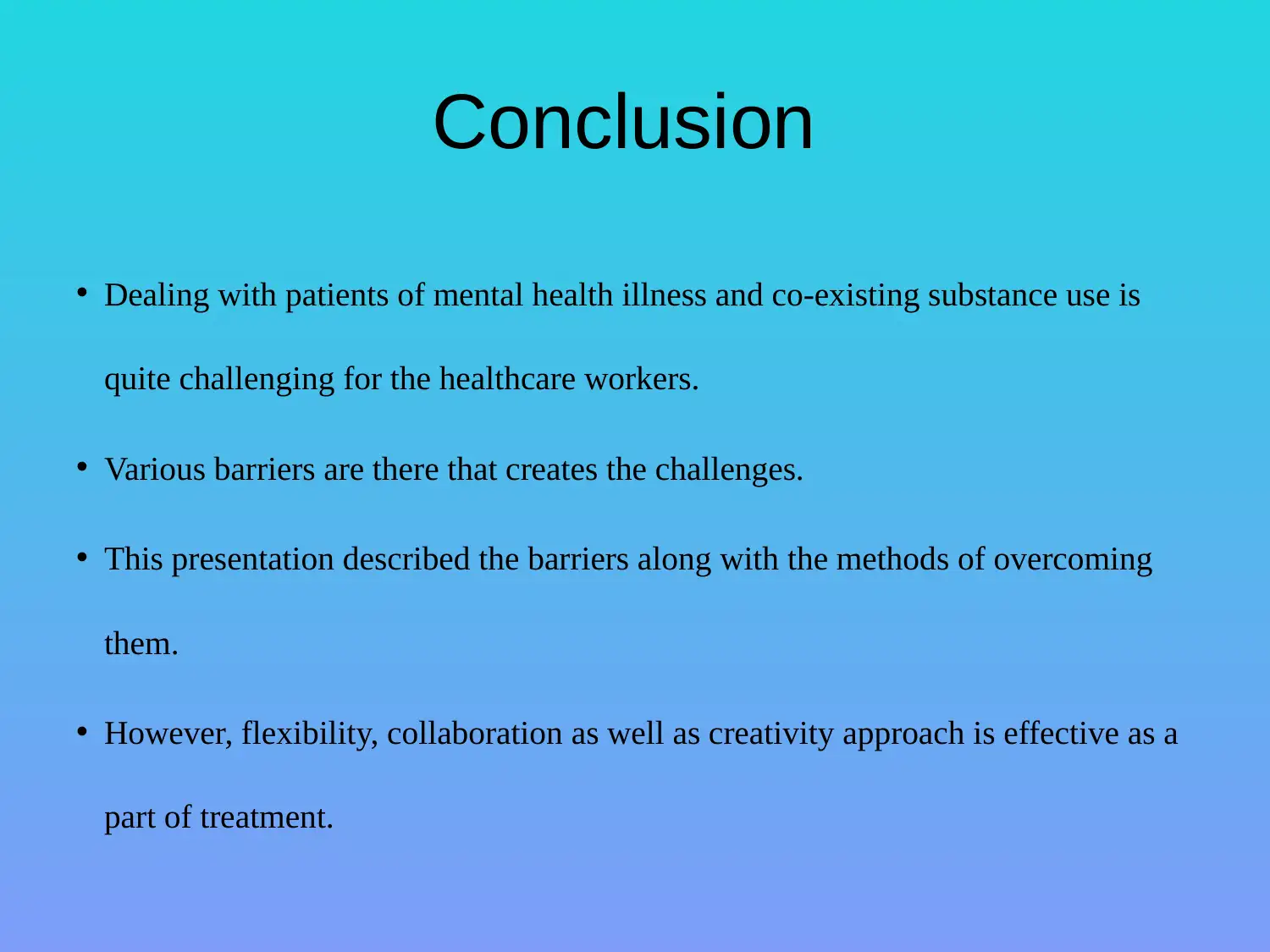
Conclusion
• Dealing with patients of mental health illness and co-existing substance use is
quite challenging for the healthcare workers.
• Various barriers are there that creates the challenges.
• This presentation described the barriers along with the methods of overcoming
them.
• However, flexibility, collaboration as well as creativity approach is effective as a
part of treatment.
• Dealing with patients of mental health illness and co-existing substance use is
quite challenging for the healthcare workers.
• Various barriers are there that creates the challenges.
• This presentation described the barriers along with the methods of overcoming
them.
• However, flexibility, collaboration as well as creativity approach is effective as a
part of treatment.
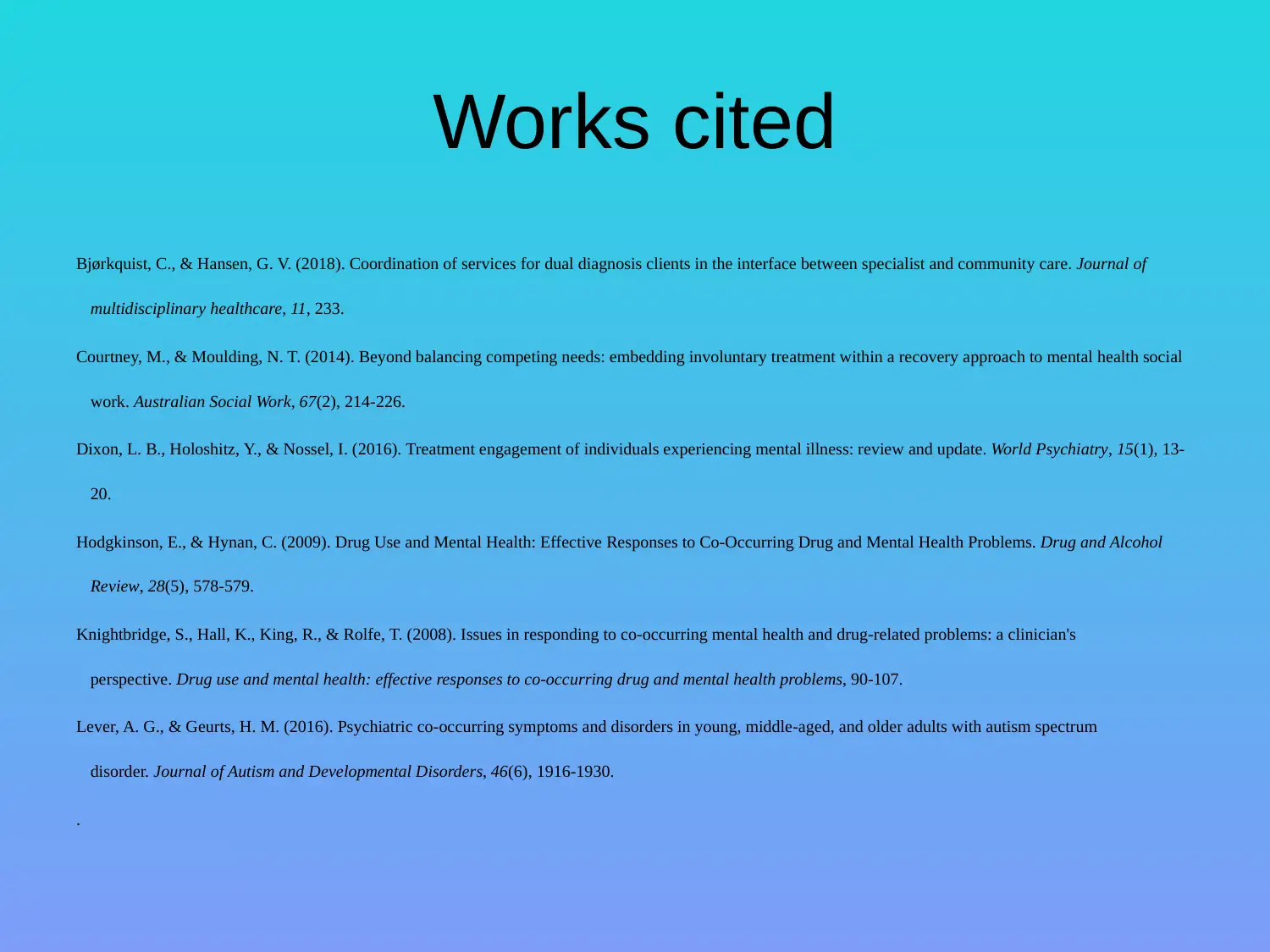
Works cited
Bjørkquist, C., & Hansen, G. V. (2018). Coordination of services for dual diagnosis clients in the interface between specialist and community care. Journal of
multidisciplinary healthcare, 11, 233.
Courtney, M., & Moulding, N. T. (2014). Beyond balancing competing needs: embedding involuntary treatment within a recovery approach to mental health social
work. Australian Social Work, 67(2), 214-226.
Dixon, L. B., Holoshitz, Y., & Nossel, I. (2016). Treatment engagement of individuals experiencing mental illness: review and update. World Psychiatry, 15(1), 13-
20.
Hodgkinson, E., & Hynan, C. (2009). Drug Use and Mental Health: Effective Responses to Co‐Occurring Drug and Mental Health Problems. Drug and Alcohol
Review, 28(5), 578-579.
Knightbridge, S., Hall, K., King, R., & Rolfe, T. (2008). Issues in responding to co-occurring mental health and drug-related problems: a clinician's
perspective. Drug use and mental health: effective responses to co-occurring drug and mental health problems, 90-107.
Lever, A. G., & Geurts, H. M. (2016). Psychiatric co-occurring symptoms and disorders in young, middle-aged, and older adults with autism spectrum
disorder. Journal of Autism and Developmental Disorders, 46(6), 1916-1930.
.
Bjørkquist, C., & Hansen, G. V. (2018). Coordination of services for dual diagnosis clients in the interface between specialist and community care. Journal of
multidisciplinary healthcare, 11, 233.
Courtney, M., & Moulding, N. T. (2014). Beyond balancing competing needs: embedding involuntary treatment within a recovery approach to mental health social
work. Australian Social Work, 67(2), 214-226.
Dixon, L. B., Holoshitz, Y., & Nossel, I. (2016). Treatment engagement of individuals experiencing mental illness: review and update. World Psychiatry, 15(1), 13-
20.
Hodgkinson, E., & Hynan, C. (2009). Drug Use and Mental Health: Effective Responses to Co‐Occurring Drug and Mental Health Problems. Drug and Alcohol
Review, 28(5), 578-579.
Knightbridge, S., Hall, K., King, R., & Rolfe, T. (2008). Issues in responding to co-occurring mental health and drug-related problems: a clinician's
perspective. Drug use and mental health: effective responses to co-occurring drug and mental health problems, 90-107.
Lever, A. G., & Geurts, H. M. (2016). Psychiatric co-occurring symptoms and disorders in young, middle-aged, and older adults with autism spectrum
disorder. Journal of Autism and Developmental Disorders, 46(6), 1916-1930.
.
⊘ This is a preview!⊘
Do you want full access?
Subscribe today to unlock all pages.

Trusted by 1+ million students worldwide
1 out of 14
Related Documents
Your All-in-One AI-Powered Toolkit for Academic Success.
+13062052269
info@desklib.com
Available 24*7 on WhatsApp / Email
![[object Object]](/_next/static/media/star-bottom.7253800d.svg)
Unlock your academic potential
Copyright © 2020–2025 A2Z Services. All Rights Reserved. Developed and managed by ZUCOL.





